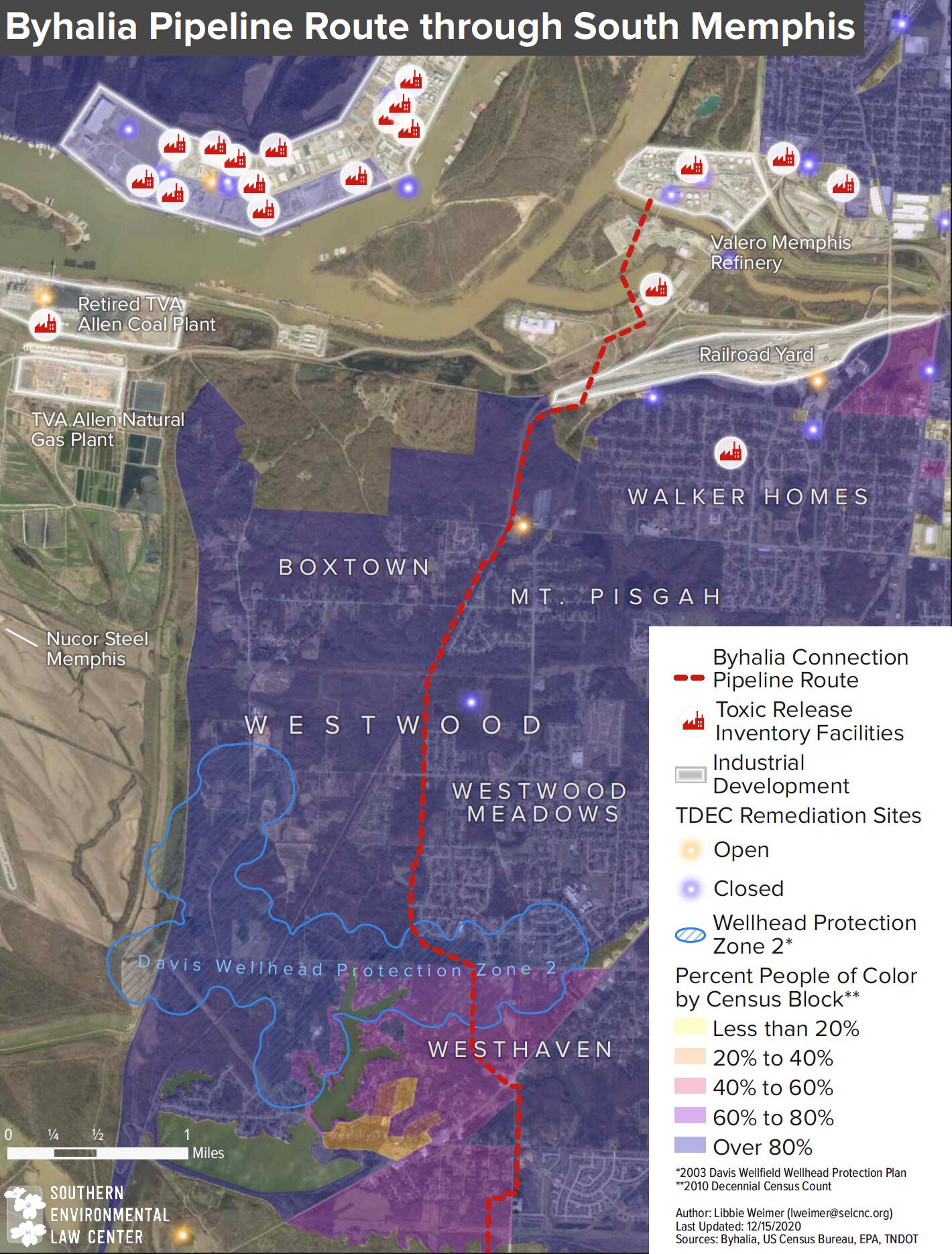 Protect Our Aquifer
Protect Our Aquifer
The proposed route of the Byhalia Connection Pipeline.
A Memphis City Council committee will reconvene in two weeks to reconsider a resolution to oppose the proposed Byhalia Connection Pipeline that would run through southwest Memphis.
A joint venture with two companies — Valero and Plains All American Pipeline — began surveying here last year for a project to build a 49-mile pipeline from Memphis to Marshall County, Mississippi for a new pipeline that would connect to other crude-oil pipelines in the area. Plains All American spokeswoman Katie Martin told council members here Tuesday the company hopes to begin construction of the pipeline within a few months and then wrap up the construction within nine months.
A resolution opposing the plan from council members Dr. Jeff Warren and Edmund Ford got a lengthy hearing Tuesday of more than one hour. In the end, council members voted to hold the item for two weeks to allow for more testimony and more time to gather facts.
The resolution specifically asks Memphis Light, Gas & Water (MLGW) to refuse an easement across any of its property for the project. While MLGW officials said the utility only owns a small portion of the land on the pipeline route, Warren asked that they deny the company rights to it.
Warren and Ford oppose the pipeline as it would sit above the Memphis Sand Aquifer, the source of the city’s famously pure drinking water, and the Davis Wellhead, where some of that water is drawn. The pipeline would also run through Ford’s mostly Black district.
The resolution says African Americans were and are 75 percent more likely to reside near “toxic” oil and gas infrastructure. It points to data from the Journal of the National Cancer Institute that living within 30 miles of this infrastructure increases the risk of developing cancers including lymphoma, lung cancer, breast cancer, colon cancer, and prostate cancer. Susceptibility to these diseases increase with age, according to the resolution. More than 35 percent of Memphians living in that proximity to the proposed pipeline are 50 years old and above, the resolution says.
[pullquote-1-center] “I do not want to be Flint, Michigan,” Ford said. “Flint, Michigan, was Black people and my district is Black people and that ain’t going to happen.”
Martin, the Plains All American spokeswoman, claimed the company’s pipelines are safe, protected by the “latest and greatest technology,” including constant pressure monitoring and weekly inspection flyovers.
Martin said the economic impact of the pipeline could be as high as $3 million. The company has already given $1 million to local charities. Also, she said 94 percent of landowners on the pipeline route have agreed to sell the company easements across their land. Though, she admitted some land would likely have to be acquired through eminent domain, or taken by the government or by a purchase forced by the government for the public benefit.
In the resolution, Ford and Warren say the pipeline “fails to confer some benefit or advantage to the public” in Memphis and Shelby County. For this, they said arguments for eminent domain are “spurious.”
Protect Our Aquifer, a Memphis group seeking protection of the Memphis Sand Aquifer, asked its members to lobby their city council representatives to join the resolution and oppose the pipeline.
“This is what environmental injustice looks like,” reads a Monday email from Protect Our Aquifer. “They are asking a poor African American neighborhood — once again — to bear the burden of invasive construction, the potential of pollution, reduced property values, and quality of life to help a Texas corporation make billions of dollars.”
“There is no community benefit for this pipeline. Only risk to our drinking water. The crude oil in this high-pressure pipeline is headed for the Gulf of Mexico for export.”
[pullquote-2-center] The sentiment was echoed in a fiery speech Tuesday from Justin Pearson, who leads a group called Memphis Community Against Pipeline. He said the route was picked because those along it were majority Black, a process of “racist capitalism” through the “path of least resistance.”
“This is the community speaking back,” Pearson said of his testimony during Tuesday’s hearing. “The community is saying we don’t want oil in the soil. These people are being picked up by a billion-dollar corporation because they are the path of least resistance.”
[pullquote-3-center] Scott Crosby, an attorney with the Memphis law firm Burch, Porter & Johnson, told council members he is now representing private landowners along the pipeline route in the Boxtown area. He said some there refused to sell their land and were sued in condemnation proceedings. Others, he said, agreed to Byhalia’s terms because they thought they had no recourse. Several cases related to pipeline land acquisition there have been rolled into one, Crosby said, and hearings are set to begin on the matter next week.
“What we are asking council to do is to support this resolution and step in for individual landowners,” Crosby said, “and say to Byhalia Connection, ‘Memphis doesn’t want this pipeline.’”